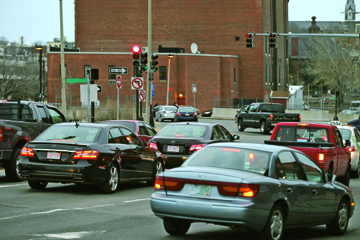 The Denver Community Planning and Development Department under Brad Buchanan repeatedly has publicly declared that its overarching goal in planning and zoning for the City and County of Denver is “transparency, partnership and meaningful public involvement.”
The Denver Community Planning and Development Department under Brad Buchanan repeatedly has publicly declared that its overarching goal in planning and zoning for the City and County of Denver is “transparency, partnership and meaningful public involvement.”
Denver neighborhood leader and attorney Greg Kirwin, however, described what actually happens “as anyone with experience trying to shape their neighborhood knows, the land use process is primarily a collaboration between planning staff and consultants for the developers who cherry-pick language from Denver’s Plans and Zoning Code to build whatever kind of new development they want.” He went on to note, “The playing field is tilted in favor of developers throughout the planning process despite the illusion of ‘outreach’ to residents.”
Neighborhood activist Chris O’Connor was even more brutal declaring, “Mayor Hancock and his planners are trying to jam high-density, high-rise buildings into every Denver neighborhood without regard for thriving, existing communities and without adequate infrastructure . . . The entire process must be reformed.”
How does Mayor Hancock, Planning Director Brad Buchanan and the thoroughly compromised Denver Planning Board get away with such a perverted and corrupt system? First, of course, is the fact that the Denver City Council is also controlled by real estate developers and their friends. While three pro neighborhood candidates won this last election they are still only less than one-fourth of the entire 13 member council.
Another problem, of course, is that the paper of record for the city, The Denver Post, has generally buried the story of how real estate projects actually get approved and are helping to destroy the city’s neighborhoods in order to not anger the Hancock administration or its allies. Moreover the local state courts have refused to address concerns when presented with lawsuits by angry citizens. The local courts and judges similarly refused to address the brutality and corruption in the Denver Jail and City Attorney’s Office. Only when a courageous federal district court judge, John Kane, refused to look the other way were any reforms undertaken. Unfortunately, planning and zoning questions normally do not involve federal questions of law.
Finally, the zoning and planning process is highly complex and knowing how to reform the corrupt system is not easy. Fortunately, the Inter-Neighborhood Cooperation (INC) has set forth the principles for an honest system in a seven page “Platform for Denver Planning and Zoning,” which is available at the entity’s website. INC is the umbrella group for Denver’s myriad neighborhood groups called Registered Neighborhood Organizations or RNOs.
Many of the principles are just common sense and it is shocking that many of them are not included in the present broken system. The platform urges the mayor and other city officials to appoint representatives of RNOs to all city boards, commissions, advisory committees, etc. Presently only shills for developers need apply for positions on the Denver Planning Board or the Parks and Recreation Advisory Board. At one time an appointment to one of these boards was a badge of honor while today it is a mark of shame. In many sections of the city if an individual has been appointed to either board by Mayor Hancock, he or she is highly unlikely to be able to successfully run for an elective office in the future.
INC’s Platform has many important provisions but perhaps its greatest guiding principle is that “higher density development, zoning or projects should not be approved unless it can be shown that adverse traffic and parking impacts on the neighborhood will not result or will be mitigated. Traffic and parking impacts can cause serious harm to the quality of life and economic vitality in a neighborhood.” Under the present system parking ratios have been steadily decreased and the city literally declares that it will not ever consider traffic impacts. It is not clear if any other major city in the country refuses to consider traffic impacts when approving major real estate projects.
City planners have publicly stated that they want to make Denver less automobile friendly and force residents to ride bikes and take public transportation. Unfortunately, the public transportation system in Denver generally stinks and while a single millennial might be happy to take a bike around town, a mother with three small children might find such a dictate from a planning official ludicrous, particularly during the winter season.
Any future candidate for City Council should be asked to adopt and approve INC’s Platform for Denver Planning and Zoning. Any candidate who does not is probably not someone one would want on the City Council. More boldly, neighborhood groups might want to ask existing city councilmembers if they will adopt the INC’s Platform. If they refuse, some may begin to wonder whether they want those persons on the City Council at all. The City Charter provides a method by which citizens can undertake to remove from office a person who ceases to represent their interests and that method, recall, is being increasingly used throughout Colorado by angry citizens of all different political stripes. No city councilmember has ever been recalled in the history of Denver, but there is always a first time for everything.
— Editorial Board

